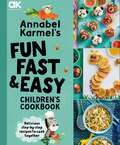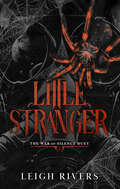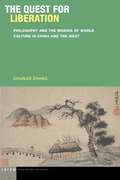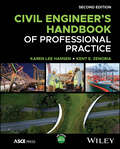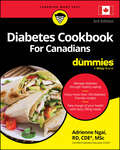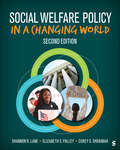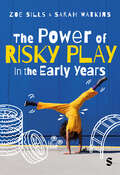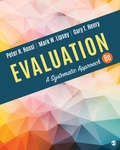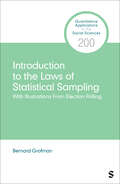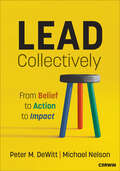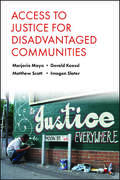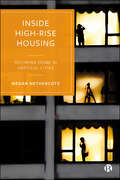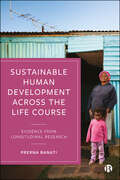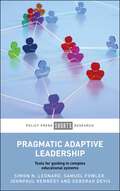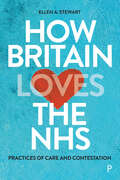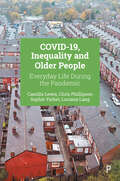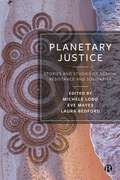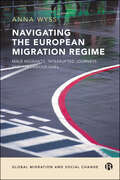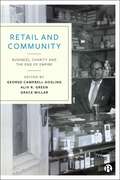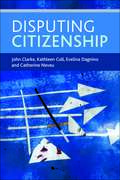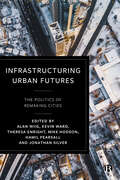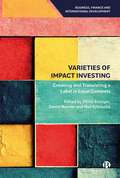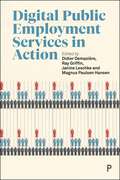- Table View
- List View
Annabel Karmel's Fun, Fast and Easy Children's Cookbook
by Annabel KarmelSimple recipes to make mealtimes fun for even the fussiest eaters!Did you know that cooking actually encourages fussy eaters to eat, as they're more likely to dig in to something they've prepared?Instil a love of cooking to last a lifetime with Annabel Karmel's Fun, Fast and Easy Children's Cookbook. The latest book from the UK's no.1 children's cookbook author is the ultimate kitchen companion for young children and their parents, turning mealtimes into the most fun part of the day, no matter how picky your child!Inside, you'll find: • Delicious, easy-to-make recipes from Perfect Pancakes and Teddy Bear Burgers, to Animal Cupcakes • Vibrant, enticing photography • Fascinating food facts to make mealtimes fun • Step-by-step instructions to make recipes for breakfast, lunch, dinner, snacks and treats • Essential kitchen tips to get the family cooking together • Stunning illustrations by Bryony ClarksonThis book is guaranteed to be loved by both little ones and adults alike, and provides the perfect opportunity to cook up delicious recipes and memories to treasure for a lifetime.Adults will love the emphasis on fresh, wholesome ingredients and clear, simple instructions. Little ones will love preparing and savouring the delicious dishes, all the while learning a host of skills along the way. From learning how to make their very first omelette, to discovering how to tell whether an egg is fresh without breaking it, and even how to peel bananas like a monkey, your little foodie will have their foundations for cooking set for life.Plus, with recipes including everything from sizzling stir-fries, orzo pasta jars and nutritious noodle pots, there's something for even the pickiest eater.With a mix of great recipes and foodie fun, this is the perfect cookbook for young families everywhere, and a must-have in any household with little ones!
Little Stranger (Web of Silence #1)
by Leigh RiversFrom USA Today bestselling author and TikTok sensation comes the gripping, steamy taboo romance series that everyone is talking about!'Filled with tension, heartbreak and electric chemistry. This one will tear your heart right out of your chest before tossing it back in and sewing you up' No. 1 New York Times bestselling author Brynne WeaverOwning her was all he ever wanted . . .Everything about Olivia belongs to Malachi Vize. Her mind. Her body. Her soul. Her fear. Her pain.When she sends him to prison, her betrayal runs deep. Now free, he wants revenge against the one girl he shouldn't want. His forbidden obsession. His foster sister. He's spent years planning for this, and now he's ready to haunt her.When Halloween comes, he can longer lurk in the shadows. All he has left to own is her heart, even if he needs to take it.Little Stranger is a dark, taboo romance and contains explicit sexual content and difficult themes. Please read the content warnings before reading. Recommended 18+.--Readers love the Web of Silence duet!'This duet is nothing short of magnificent' ⭐⭐⭐⭐⭐'Words cannot describe how much I love this book' ⭐⭐⭐⭐⭐'It was DELICIOUS' ⭐⭐⭐⭐⭐'When I say I want dark romance . . . THIS IS WHAT IM TALKING ABOUT' ⭐⭐⭐⭐⭐Tropes: 🖤 Forbidden romance🔐 Anti-hero MMC🕷 Touch her and d*e⛓ Second chance romance❤️🔥 Hidden identity🕸 Selective mutism (MMC)
The Quest for Liberation: Philosophy and the Making of World Culture in China and the West (Idiom: Inventing Writing Theory)
by Chunjie ZhangContemporary debate on cosmopolitanism routinely refers to Immanuel Kant as its intellectual origin. A group of Chinese and German-speaking thinkers in the early twentieth century, however, used classical Chinese philosophy as an alternative intellectual genealogy to reimagine ethics, politics, society, and modernity for the entire world. Their engagement with Confucianism, Taoism, and Buddhism broadens the scope of global intellectual history to include a non-European origin of concepts and ideas.Due to the differences in their local crises, the Chinese and the European stories are often narrated in separate national and cultural contexts. Bridging the critical divide between China and the West, The Quest for Liberation examines the thinkers’ shared interest in Chinese philosophy and their common effort to envision a world culture other than Western modernity. Breaking with the common logic of either studying the reception and adaptation of Western ideas in the East or critiquing the misrepresentation of the East in the West, Zhang’s book emphasizes entanglements between Chinese and European thinkers and highlights their quest for liberation in a globalizing world. Their visions of an ontological commons for everyone help us imagine a better world community in our time of global crises, beyond the clash of civilizations.This book is available from the publisher on an open access basis.
Civil Engineer's Handbook of Professional Practice
by Karen Lee Hansen Kent E. ZenobiaA single-source guide to the professional practice of civil engineering Civil Engineer’s Handbook of Professional Practice, Second Edition assists students and practicing and professional engineers in addressing the many challenges they face. This guide expands on the practical skills defined by the American Society of Civil Engineers’ (ASCE’s) Civil Engineering Body of Knowledge (CEBOK) and provides illuminating techniques, quotes, example problems/solutions, case studies, and valuable information that engineers encounter in the real world. Including critical information on project management, leadership, and communication, this powerful resource distills the Accreditation Board for Science and Technology’s (ABET’s) requirements for a successful career and licensure. Due to the large amount of information that is presented in an easy-to-digest way, this handbook enables civil engineers to be competitive at an international level, building on their traditional strengths in technology and science while also providing the ability to master the business of civil engineering. In this second edition, readers will find: Modern business topics such as design thinking, affirmative action, equal opportunity and diversity, negotiation, health and safety requirements, construction management, body language interpretation skills, project management, and schedulingKey discussions of executing a professional commission, the engineer’s role in project development, professional engagement, and ethicsUpdated examples of everyday challenges for civil engineers, including defining the project, establishing objectives and innovative approaches, identifying resources and constraints, preparing a critical path schedule, quality control, and orchestrating project deliveryThe latest applications of emerging technologies, globalization impacts, and new sustainability applications for civil engineersExamples of a civil engineering request for proposal and corresponding workplan and feasibility study, technical report, specification, contracts, and scheduling and cost control tools Providing comprehensive coverage and in-depth guidance from leading industry and academic professionals, Civil Engineer’s Handbook of Professional Practice, Second Edition is a valuable reference for early-career and experienced civil engineers alike. It is also highly appropriate for upper-level undergraduate and graduate courses in Professional Practice and Engineering Project Management. Instructors have access to an instructor’s manual via the book’s companion website.
Diabetes Cookbook For Canadians For Dummies
by Adrienne NgaiPractical and delicious recipes for people with prediabetes and diabetes looking to stay healthy and satisfied Diabetes Cookbook For Canadians For Dummies helps you manage your condition while eating well. Inside, you'll find easy-to-follow recipes for every meal, to the point information from the latest Diabetes Canada Clinical Practice Guidelines, and guidance on treatments and lifestyle changes that can help you be and feel better. This updated edition features new information on weight loss medications, plant-based meat and dairy alternatives, new and easy recipes, and other key revisions that make this book a must. Plus, you'll find air fryer and Instant Pot recipes, ideas for using all your cooking gadgets, and handy guidelines that you can use to balance your diet. Delicious, nutritious, diabetes-friendly meals are headed your way, thanks to this Dummies guide. Discover ways to eat well while managing your diabetes Find expert tips for pairing a healthy diet with other lifestyle changes and treatments Update yourself on the latest Canadian diabetes and nutrition recommendations Get inclusive, satisfying recipes and weight loss recommendations Diabetes Cookbook For Canadians For Dummies is an excellent resource for those with prediabetes or diabetes looking to manage their condition. If you have a loved one with diabetes, this book will help you cook meals that can help manage their blood sugars and are satisfying for both of you.
Social Welfare Policy in a Changing World
by Corey S. Shdaimah Shannon R. Lane Elizabeth S. PalleyThis textbook is designed to help students develop the nine core social work competencies outlined by the Council on Social Work Education (CSWE) in its 2022 Educational Policy and Accreditation Standards (EPAS). Visit the 2022 EPAS website to learn more about these standards and competencies. Social Welfare Policy in a Changing World, Second Edition offers an engaging, student-friendly approach that links policy and practice, while employing a critical analytic lens to U.S. social welfare policy. With particular attention to disparities based on class, race/ethnicity, ability, sexual orientation and gender, Shannon R. Lane, Elizabeth S. Palley, and Corey S. Shdaimah assess the impact of policies at the micro, meso, and macro levels. The authors provide a brief foundation in history, the policy process, and theory, while primarily helping students understand how policy shapes their lives, communities, and clients. Connecting description, theoretical analysis, and advocacy, this text challenges readers to critically assess policy development, its consequences, and future implications. Students will come away with a newfound understanding of how to use the political process to address social justice issues and advocate for meaningful policy change.
The Power of Risky Play in the Early Years
by Sarah Watkins Zoe sillsHarness the learning Power of Risky Play in the Early Years. Now, more than ever, children need to develop autonomy and decision-making skills. Too often in Early Years settings, opportunities for learning through risky play are missed. In this book, Zoe Sills and Sarah Watkins support you to overcome the barriers to embedding and allowing space for risky play in your setting. *Know the value of Risky Play *Create a learning environment that encourages and supports Risky Play *Feel confident to allow the time and space for Risky Play *Develop a better understanding of risk and learning. Children know what they need for their bodies and minds. Through self-directed play, children naturally challenge themselves. They test their physical and emotional boundaries as part of cognitive and physical development. We should be supporting this child-led learning in the Early Years, not limiting it. This book helps you to do this - to harness the learning power of Risky Play.
Evaluation: A Systematic Approach
by Peter H. Rossi Gary T. Henry Mark W. LipseyThe long-awaited new edition is here! Evaluation: A Systematic Approach, by Peter H. Rossi, Mark W. Lipsey, and Gary T. Henry, is the best-selling comprehensive introduction to the field of program evaluation, covering the range of evaluation research activities used in appraising the design, implementation, effectiveness, and efficiency of social programs. Evaluation domains are presented in a coherent framework that not only explores each, but recognizes their interrelationships, their role in improving social programs and the outcomes they are designed to affect, and their embeddedness in social and political context. Relied on as the "gold standard" by professors, students, and practitioners for 40 years, the new Eighth Edition includes a new practical chapter on planning an evaluation, entirely new examples throughout, and a major re-organization of the book’s content to better serve the needs of program evaluation courses. "The Eighth Edition of Evaluation is a massive improvement on an already stellar text. The breadth and depth of coverage—while still keeping a practical focus—make this the go-to book for program evaluation classes and practitioners alike." —B. Andrew Chupp, Indiana University Available with Perusall—an eBook that makes it easier to prepare for class Perusall is an award-winning eBook platform featuring social annotation tools that allow students and instructors to collaboratively mark up and discuss their SAGE textbook. Backed by research and supported by technological innovations developed at Harvard University, this process of learning through collaborative annotation keeps your students engaged and makes teaching easier and more effective.
Introduction to the Laws of Statistical Sampling: With Illustrations From Election Polling (Quantitative Applications in the Social Sciences)
by Bernard GrofmanIntroduction to the Laws of Statistical Sampling is a clear, concept-driven guide for readers new to statistical sampling, including doctoral students and early-career researchers. Requiring only basic algebra and access to Excel, Bernard Grofman uses simulation and real-world examples—especially from election polling—to build intuition around the Central Limit Theorem and other foundational principles. Structured around six essential questions and ten "laws" of statistical sampling, the book walks readers step by step through reasoning and calculations, highlighting common pitfalls and counterintuitive results. With its accessible language, practical focus, and deep pedagogical insight, this monograph is both a primer for beginners and a valuable refresher for experienced analysts.
Introduction to the Laws of Statistical Sampling: With Illustrations From Election Polling (Quantitative Applications in the Social Sciences)
by Bernard GrofmanIntroduction to the Laws of Statistical Sampling is a clear, concept-driven guide for readers new to statistical sampling, including doctoral students and early-career researchers. Requiring only basic algebra and access to Excel, Bernard Grofman uses simulation and real-world examples—especially from election polling—to build intuition around the Central Limit Theorem and other foundational principles. Structured around six essential questions and ten "laws" of statistical sampling, the book walks readers step by step through reasoning and calculations, highlighting common pitfalls and counterintuitive results. With its accessible language, practical focus, and deep pedagogical insight, this monograph is both a primer for beginners and a valuable refresher for experienced analysts.
Lead Collectively: From Belief to Action to Impact
by Michael Nelson Peter M. DeWittA new way to think together, work together, and impact students… together. Despite regular meetings and planning sessions, collective leader efficacy often remains an untapped resource, leaving leadership teams working in silos and increasing the challenge of creating environments where every student and adult can thrive. Lead Collectively bridges this gap by providing a comprehensive framework for shared understanding, joint work, and evidence-based decision-making to strengthen leadership teams and amplify their impact on teaching and learning. Drawing on decades of leadership experience and research, authors Peter M. DeWitt and Michael Nelson offer actionable tools, protocols, and insights to help educational leaders foster trust, coherence, and accountability. Additional features include: A step-by-step Collaborative Inquiry Cycle to guide leadership teams from identifying problems of practice to tracking measurable results Guidance on integrating AI tools to analyze data, assess impact, and enhance collaboration Case studies and real-world stories illustrating how schools and districts have transformed their leadership practices through collective efficacy More than a guide, Lead Collectively is an invitation for leaders to foster collaboration to achieve meaningful, lasting change. Whether you’re leading at the school or district level, this book equips you with the tools to grow as a leader and drive measurable improvement for your students and educators.
The Power of Risky Play in the Early Years
by Sarah Watkins Zoe sillsHarness the learning Power of Risky Play in the Early Years. Now, more than ever, children need to develop autonomy and decision-making skills. Too often in Early Years settings, opportunities for learning through risky play are missed. In this book, Zoe Sills and Sarah Watkins support you to overcome the barriers to embedding and allowing space for risky play in your setting. *Know the value of Risky Play *Create a learning environment that encourages and supports Risky Play *Feel confident to allow the time and space for Risky Play *Develop a better understanding of risk and learning. Children know what they need for their bodies and minds. Through self-directed play, children naturally challenge themselves. They test their physical and emotional boundaries as part of cognitive and physical development. We should be supporting this child-led learning in the Early Years, not limiting it. This book helps you to do this - to harness the learning power of Risky Play.
Access to Justice for Disadvantaged Communities
by Marjorie MayoEPUB and EPDF available Open Access under CC-BY-NC-ND licence. Access to justice for all, regardless of the ability to pay, has been a core democratic value. But this basic human right has come under threat through wider processes of restructuring, with an increasingly market-led approach to the provision of welfare. Professionals and volunteers in Law Centres in Britain are struggling to provide legal advice and access to welfare rights to disadvantaged communities. Drawing upon original research, this unique study explores how strategies to safeguard these vital services might be developed in ways that strengthen rather than undermine the basic ethics and principles of public service provision. The book explores how such strategies might strengthen the position of those who provide, as well as those who need, public services, and ways to empower communities to work more effectively with professionals and progressive organisations in the pursuit of rights and social justice agendas more widely.
Inside High-Rise Housing: Securing Home in Vertical Cities
by Megan NethercoteEPDF and EPUB available Open Access under CC-BY-NC-ND licence. Condominium and comparable legal architectures make vertical urban growth possible, but do we really understand the social implications of restructuring city land ownership in this way? Geographer and architect Megan Nethercote enters the condo tower to explore the hidden social and territorial dynamics of private vertical communities. Informed by residents’ accounts of Australian high-rise living, this book shows how legal and physical architectures fuse in ways that jeopardize residents’ experience of home and stigmatize renters. As cities sprawl skywards and private renting expands, this compelling geographic analysis of property identifies high-rise development’s overlooked hand in social segregation and urban fragmentation, and raises bold questions about the condominium’s prospects.
Sustainable Human Development Across the Life Course: Evidence from Longitudinal Research
by Prerna BanatiEPDF and EPUB available Open Access under CC-BY-NC licence. It is critical that the wellbeing of society is systematically tracked by indicators that not only give an accurate picture of human life today but also provide a window into the future for all of us. This book presents impactful findings from international longitudinal studies that respond to the United Nations’ Agenda 2030 commitment to “leave no-one behind”. Contributors explore a wide range and complexity of pressing global issues, with emphasis given to excluded and vulnerable populations and gender inequality. Importantly, it sets out actionable strategies for policymakers and practitioners to help strengthen the global Sustainable Development Goals framework, accelerate their implementation and improve the construction of effective public policy.
Pragmatic Adaptive Leadership: Tools for Guiding in Complex Educational Systems
by Simon N. Leonard Samuel Fowler JohnPaul Kennedy Deborah DevisTraditional governance in education often struggles to accommodate the dynamic and evolving interactions between cognitive, emotional and socio-cultural factors that shape learning. This book introduces Pragmatic Adaptive Leadership, a systems-based approach that equips leaders and researchers with the tools to develop adaptive models of educational change. Drawing on social theory and complexity science, the authors provide practical frameworks for shaping future-orientated decision-making and policy development that meets learners where they are. Essential reading for school leaders, policy makers, educators and researchers of learning sciences, this book offers vital tools for complexity-informed leadership.
How Britain Loves the NHS: Practices of Care and Contestation
by Ellen A. StewartEPDF and EPUB available Open Access under CC-BY-NC-ND licence. What does it mean to love a healthcare system? It is often claimed that the UK population is unusually attached to its National Health Service, and the last decade has seen increasingly visible displays of gratitude and love. While social surveys of public attitudes measure how much Britain loves the NHS, this book mobilises new empirical research to ask how Britain loves its NHS. The answer delves into a series of public practices – such as campaigning, donating and volunteering within NHS organisations – and investigates how attitudes to the NHS shape patient experience of healthcare. Stewart argues that these should be understood as practices of care for, and contestation about the future of, the healthcare system. This book offers a timely critique of both the potential, and the dysfunctions, of Britain’s complex love affair with the NHS.
COVID-19, Inequality and Older People: Everyday Life during the Pandemic
by Chris Phillipson Camilla Lewis Sophie Yarker Luciana LangEPDF and EPUB available Open Access under CC-BY-NC-ND licence. This book provides new insights into the challenges facing older people in the context of the COVID-19 pandemic. It draws upon novel qualitative longitudinal research which recorded the experiences of a diverse group of people aged 50+ in Greater Manchester over a 12-month period during the pandemic. The book analyses their lived experiences and those of organisations working to support them, shedding light on the isolating effects of social distancing. Focusing on interviews with 21 organisations, as well as 102 people from four ethnic/identity groups, the authors argue that the pandemic exacerbated existing inequalities in the UK, disproportionately affecting low-income neighbourhoods and minority ethnic communities. The book outlines recommendations in relation to developing a ‘community-centred approach’ in responding to future variants of COVID-19, as well as making suggestions for how to create post-pandemic neighbourhoods.
Planetary Justice: Stories and Studies of Action, Resistance and Solidarity
by Michele LoboAvailable open access digitally under CC-BY-NC-ND licence. Bringing together interdisciplinary climate change scholarship and grassroots activism, this book considers the possibilities of planetary justice across human difference, generations, species and the concept of life and non-life. Writing amidst bushfires, cyclones, global climate strikes and a global pandemic, contributors from the Earth Unbound Collective share stories from India, Australia, Canada and Scotland. Chapters draw on Indigenous, Black, Southern, ecosocialist and ecofeminist perspectives to call for more radical and interconnected ideas of justice and solidarity. This accessible book features diverse voices that speak with the planet in the face of climate change, biodiversity loss and extinction. It explores the politics and practices of working towards a future where the planet thrives.
Navigating the European Migration Regime: Male Migrants, Interrupted Journeys and Precarious Lives (Global Migration and Social Change)
by Anna WyssEPDF and EPUB available Open Access under CC-BY-NC-ND. Amid the heavy politicisation and problematisation of male migrants in Europe, this ethnographic study casts new light on their experiences, struggles and everyday resistance. The author follows the journeys of those who seek, but have little hope of achieving, permanent residence status in European countries, tracking their successive migrations, detentions and deportations within and beyond the continent. She explores migrants’ tactics, the impact of precarity on their lives and the dual feelings of enduring hope and powerless vulnerability they experience. This is a sensitive and insightful analysis of how the European migration regime shapes, and is shaped by, migrants’ practices.
Retail and Community: Business, Charity and the End of Empire
by George Campbell Gosling, Alix R. Green and Grace MillarRetail has never existed in a vacuum. This interdisciplinary volume explores how English commercial, co-operative and charity retailing were shaped by and in turn influenced their social and political environments, from the local to the global, between the late nineteenth and early twenty-first centuries. Historians, sociologists, archivists and heritage professionals engage with current debates on the rise of modern business and the decline of the high street, class and credit, professionalisation in the voluntary sector, migration and the end of empire. This book will be a key resource to better understand retail and community in an era defined by social change, shedding new light on the enduring centrality of community relationships to modern retailers.
Disputing Citizenship
by John Clarke Kathleen Coll Evelina Dagnino Catherine NeveuAvailable Open Access under CC-BY-NC licence. Citizenship is always in dispute – in practice as well as in theory – but conventional perspectives do not address why the concept of citizenship is so contentious. This unique book presents a new perspective on citizenship by treating it as a continuing focus of dispute.The authors dispute the way citizenship is normally conceived and analysed within the social sciences, developing a view of citizenship as always emerging from struggle. This view is advanced through an exploration of the entanglements of politics, culture and power that are both embodied and contested in forms and practices of citizenship. This compelling view of citizenship emerges from the international and interdisciplinary collaboration of the four authors, drawing on the diverse disputes over citizenship in their countries of origin (Brazil, France, the UK and the US). The book is essential reading for anyone interested in the field of citizenship, no matter what their geographical, political or academic location.
Infrastructuring Urban Futures: The Politics of Remaking Cities
by Alan Wiig, Kevin Ward, Theresa Enright, Mike Hodson, Hamil Pearsall and Jonathan SilverEPDF and EPUB available Open Access under CC-BY-NC-ND licence. Focusing on material and social forms of infrastructure, this edited collection draws on rich empirical details from cities across the global North and South. The book asks the reader to think through the different ways in which infrastructure comes to be present in cities and its co-constitutive relationships with urban inhabitants and wider processes of urbanization. Considering the climate emergency, economic transformation, public health crises and racialized inequality, the book argues that paying attention to infrastructures’ past, present and future allows us to understand and respond to the current urban condition.
Varieties of Impact Investing: Creating and Translating a Label in Local Contexts (Business, Finance and International Development)
by Philip Balsiger, Daniel Burnier and Noé KaboucheAvailable open access digitally under CC-BY-NC-ND licence. A new trend in ethical finance, impact investing aims to generate positive social or environmental impacts alongside financial returns. But what does it really mean and how is it practiced across different regions and organizations? This volume explores the malleability of impact investing and how it overlaps with the development sphere to give finance a new role. From global networks to the Global South, it compares diverse investing practices and discourses. Providing an original perspective on this emerging field, this is a key resource for the scholars of social studies of finance, economic sociology, management and organization studies.
Digital Public Employment Services in Action
by Didier Demazière, Ray Griffin, Janine Leschke and Magnus Paulsen HansenThis book offers a comprehensive exploration of the ongoing digital transformation of public employment services (PES) – the most radical remaking of the welfare state in a generation. As PES shift from analogue to fully digitised services, this volume bridges the gap between technology, policy and frontline service provision. It provides a well-rounded analysis of the practical opportunities and challenges posed by digital welfare, reconnecting and reconciling technical possibilities and political ambitions with what is socially necessary as welfare systems undergo radical change.
